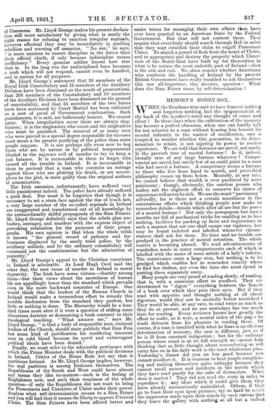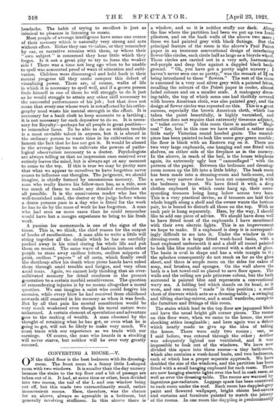MEMORY'S MONEY-BOX.
WHEN the Bourbons were said to have learned nothir g and forgotten nothing, had the epigrammatist at the back of the speaker's mind any thought of cause and effect ? In these days when the cultivation of the memory has become a perfect obsession, when one can hardly talk for ten minutes to a man without hearing him lament his mental infirmity in the matter of recollection, one is tempted to wonder whether this generation, in its deter- mination to retain, is not injuring its power to receive experience. We are told that fortunes are saved, not made. Is the proverb true of mental fortunes ? Is it, indeed, literally true of any large fortune whatever ? Compe- tencies are saved, but surely few of us could point to a man who had saved a fortune. A competency seems a fortune to those who live from hand to mouth, and proverbial philosophy comes up from below. Mentally, at any rate, we cannot believe that wealth is ever produced by mere parsimony ; though, obviously, the careless person who makes not the slightest effort to conserve his stores of experience will never be rich. We use the word "parsimony " advisedly, for is there not a certain miserliness in the ostentatious efforts which thinking people now make to remember details—details which after all are but the pence of a mental fortune ? Not only the newspapers but men's mouths are full of mechanical tricks for enabling us to lose nothing, facilities for packing up facts and impressions in such a manner that not one shall escape our vigilance, but may be found ticketed and labelled whenever circum- stances shall ask for them. No time and no trouble are grudged in the practice of mental retention. The whole matter is becoming absurd. We read advertisements of wardrobes made in many compartments each of which is labelled with the name of some article of a lady's toilette. The contrivance costs a large sum, but nothing is to be grudged which enables her to remember exactly where to find her clothes, not even the time she must spend in putting them separately away. Many people are very proud of reading slowly, of reading, that is, with a conscious effort to recollect. They arc determined to " digest " everything between the boards of a book over which they pass their eyes. But if they read with appetite and thought nothing at all about digestion, would they not be mentally better nourished ? They would be able, at any rate, to read twice as much as they do at present, and no one nowadays has too much time for reading. Every reviewer knows how greatly the effort to make, as it were, a mental index of the pag:s ho reads detracts from his pleasure in reading them. Of course, if a man is troubled with what he fears is an obvious deterioration of memory, the case is different, just as if he is ill from constant indigestion ; but for the ordinary person whose mind is at its full strength we cannot help thinking that as little thought about remembering as will carry him on in his daily work is the most wholesome plan. Yesterday's dinner did you no less good because you cannot recollect it. It is common to hear people complain- ing and making themselves quite unhappy because they cannot recall names and incidents in the novels which they have read purely for the sake of distraction. What does it matter ? They did not read the story in order to reproduce it ; any idea3 which it could give them they have already unconsciously assimilated. Others, if they go to feast their eyes upon pictures, try so bard to retain the impression made upon their minds by each canvas Oat they leave the gallery with nothing at all but a violent headache. The habit of trying to recollect is just as inimical to pleasure in listening to music. Most people of average intelligence have some one corner of their memory which is naturally very strong and acts without effort. Either they can visualize, or they remember by ear, or narrative remains with them, or where their " own subject " is concerned they hear little which they forget. Is it not a great pity to try to force the weaker side ? There was a time not long ago when to be unable to spell was accounted proof of want of education and culti- vation. Children were discouraged and held back in their mental progress till they could conquer this defect of visualizing power. There are, of course, walks of life in which it is necessary to spell well, and if a grown person finds himself in one of them he will struggle to do it just as he would struggle to attain any other skill necessary to the successful performance of his job ; but that does not mean that every one whose work is not affected by his ortho- graphy need waste his mental strength in the effort. It is necessary for a bank clerk to keep accounts to a farthing ; it is not necessary for each depositor to do so. It is neces- sary for Royalty—perhaps for all people in great position— to remember faces. To be able to do so without trouble is a most enviable talent in anyone, but it is absurd in the ordinary person to waste time in its cultivation or to lament the fact that he has not got it. It would be absurd in the average layman to cultivate the powers of patho- logical observation necessary to a doctor. Psychologists are always telling us that no impression once received ever entirely leaves the mind, but is always apt at any moment to come to the top. If this is true we may be pretty sure that what we appear to ourselves to have forgotten never ceases to influence our thoughts. The judgment, we should imagine, is chiefly formed by unconscious memory. The man who really knows his fellow-men has, as a rule, seen too much of them to make any detailed recollection at all possible. It is the omnivorous reader who has the well-nourished mind, the doctor or the judge before whom a dozen persons pass in a day who is fitted for the work he has to do by the mass of work he has forgotten. A man who had seen no more cases than he could remember would have but a meagre experience to bring to his fresh work.
A passion for memoranda is one of the signs of the times. This is, we think, the chief reason for the output of books of recollections. A man able to write a little will string together all the details which he has so carefully packed away in his mind during his whole life and put them on record. The same wave of fashion induces other people to store away endless letters, endless snippets of print, • endless " papers " of all sorts, which finally swell the dustheap after his death when pious hands have raked -them through amid trouble and fatigue, and very often amid tears. Again, we cannot help thinking that an over- cultivated memory for detail conduces in the present generation to a certain morbid sensitiveness. The question of remembering.injuries is by no means altogether amoral question. We can imagine a saint who could forgive his enemies, while every blow he had received from childhood onwards still smarted in his memory as when it was fresh. But by all that pain his mental constitution would be very much weakened even though his moral nature were unharmed. A certain element of speculation and adventure goes to the making of wealth. A man obsessed by the thought of retaining what he has got, or even what he is going to get, will not be likely to make very much. We must trade with our experience as we trade with our earnings. Of course, the man who hoards in a stocking will never starve, but neither will he ever very greatly succeed.



































 Previous page
Previous page